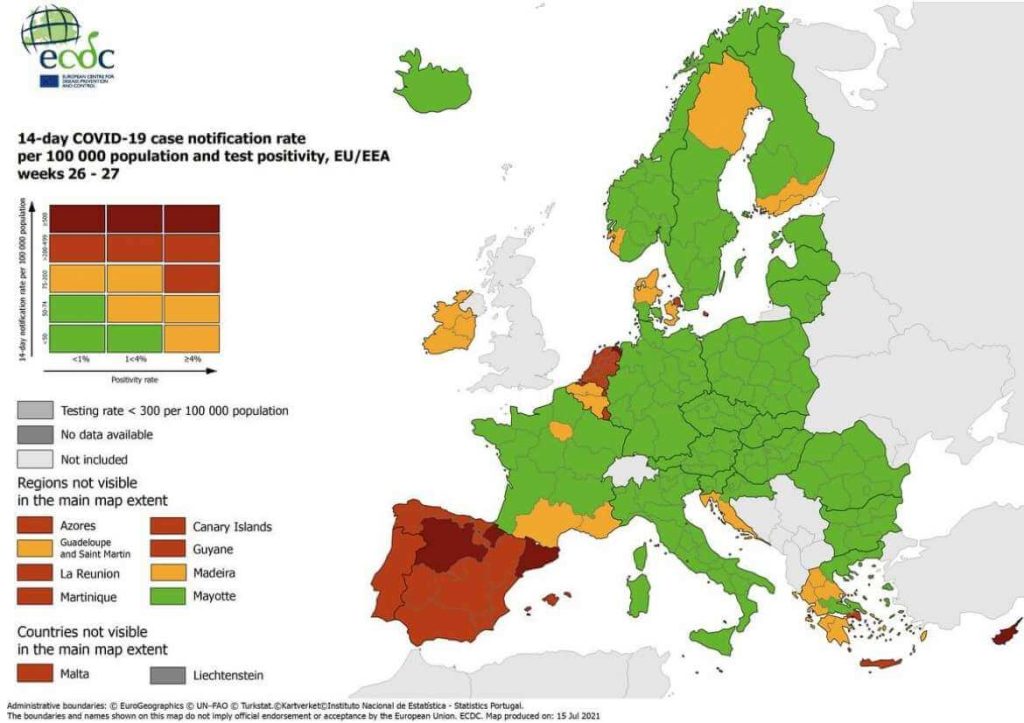“They will refer to the Croatian Adriatic according to NUTS regions, that is, the part that is currently in orange and where the incidence is growing, although not as in other countries in the Mediterranean. Croatia is holding up well compared to others. However, the numbers are growing, and we have to do something to prevent at least some events from turning into super-spreaders,” Božinović told Dnevnik Nova TV, as reported by Index.hr.
He explained that all gatherings of more than 50 to 1,000 people would have to be organized so that local headquarters and county headquarters take responsibility for their organization, while the EU digital Covid certificate is a criterion for entering the event.
“I am sure, if this is respected, that we can practically continue normally this summer, but under control,” he pointed out.
As for the numerous festivities and fairs held throughout the Adriatic, which bring together many people, Božinović explained that the point is to register these festivities and local headquarters with county officials to decide whether they can control them and whether they will let it happen. If the two headquarters do not agree and there have been such cases, then the National Civil Protection Headquarters will decide.
Božinović said that it is in the country’s interest for as many tourists as possible to come to Croatia and create conditions so that they feel safe and so that the infection does not spread too much.
In addition, he stated that weddings also have their own epidemiological framework.
“Anything over 15, now it will be practically unlimited in Dalmatia, but weddings can be 200, 300 people at most. So a Covid passport is a high guarantee that everything will go well,” said Božinović.
He also commented on sports competitions, stating that they will allow spectators to come with Covid certificates. He added that these measures should take effect on Monday.
Stricter conditions for British tourists
In addition, it was announced today that British tourists would have more difficulty entering Croatia.
All Britons, Russians, and Cypriots must have a negative test to cross the Croatian border, regardless of whether they have been vaccinated or have contracted the virus.
As far as tourism is concerned, this could have the greatest impact on the expected increased arrival of the British on the Adriatic. As a reminder, practically all measures have been lifted for them since Monday, making it easier for them to travel. Meanwhile, Portugal and Spain, the traditional destinations of British tourists, have ended up on the red epidemiological list, making entry into those countries difficult, and several measures have been introduced. Therefore, a significant number of Britons are expected to come to the Adriatic. In Britain, the Delta strain has spread significantly in recent weeks, despite high vaccination coverage, especially among young people. Therefore, there is a danger that the number of infected people in Croatia will increase, which would negatively affect the tourist season.
For these reasons, all Britons, whether vaccinated or unvaccinated, will need to show a negative PCR test.
The CNIPH published the news, which is transmitted in its entirety below.
“To protect health and prevent the spread of COVID-19, additional epidemiological measures have been introduced, which are applied when crossing the border into the territory of the Republic of Croatia to prevent the introduction of new variants of the SARS-CoV-2 virus. Furthermore, due to the above, there was a quarantine obligation for arrivals from the Republic of South Africa, Brazil, Zanzibar, and India for a period of 14 days, which a negative PCR test can shorten after 7 days.
Since the Delta strain was imported from India, it has now become dominant in the European Union. The list of countries for which quarantine is mandatory remains the Republic of South Africa, Brazil, and Zanzibar. For persons coming from India, the mandatory quarantine after crossing the border is abolished. Instead, the obligation to present a negative test result on SARS-CoV-2 is introduced within 48 hours when crossing the border if it is a rapid antigen test or within 72 hours if it is a PCR test, regardless of whether the person has contracted COVID-19 or has been vaccinated.
Due to the worse epidemiological situation in the United Kingdom, Cyprus, and the Russian Federation, as an additional measure for all persons coming from these countries, a negative SARS-CoV-2 test performed in the home country, regardless of vaccination status or recovery from COVID-19, is required before entering the territory of the Republic of Croatia.
The change will be published on the CNIPH website and will take effect on Monday, July 26, 2021,” the CNIPH said.
For all you need to know about coronavirus specific to Croatia, including vaccination points and testing sites, make sure to bookmark our dedicated COVID-19 section and select your preferred language.











